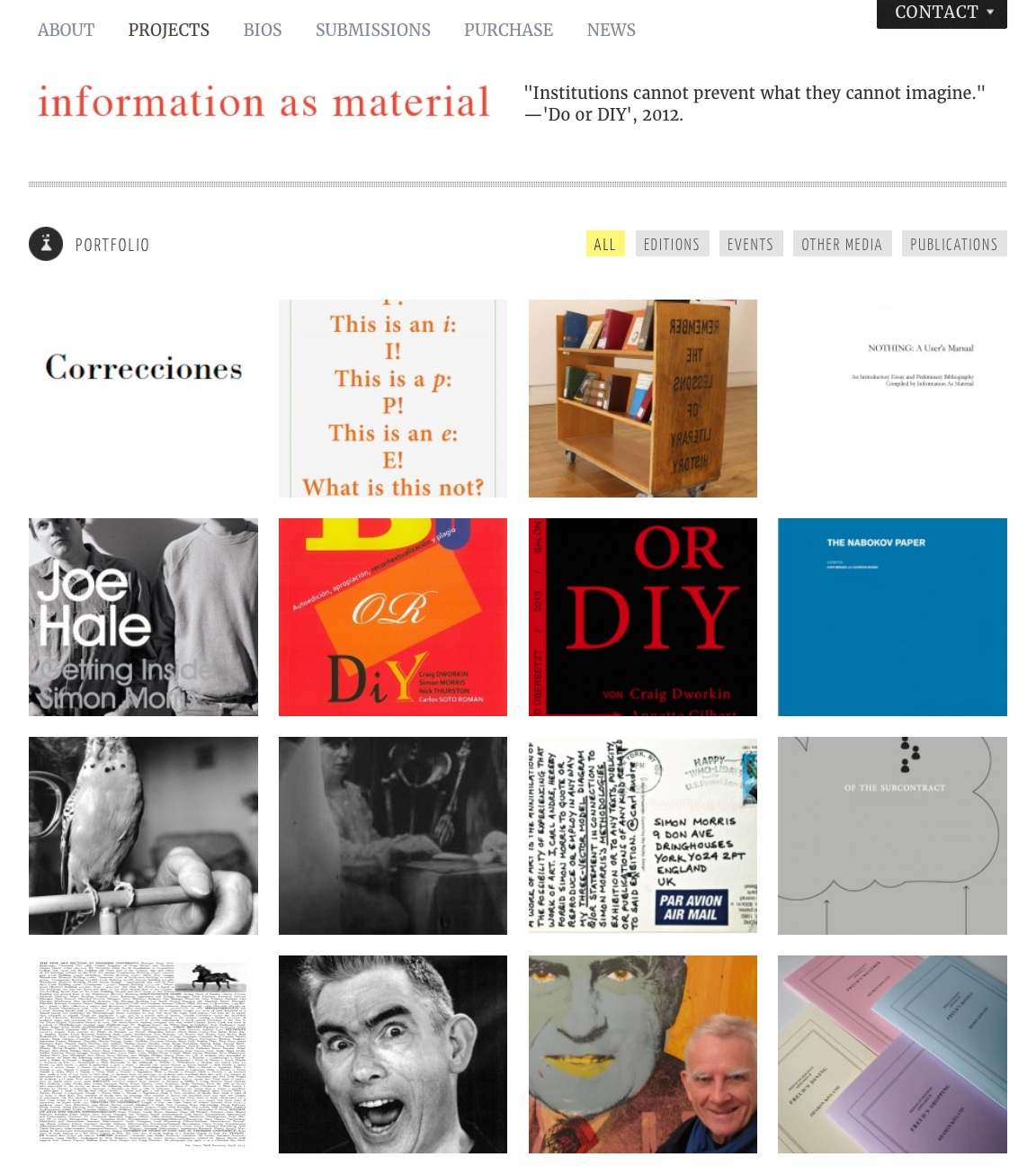Posts from June 2016
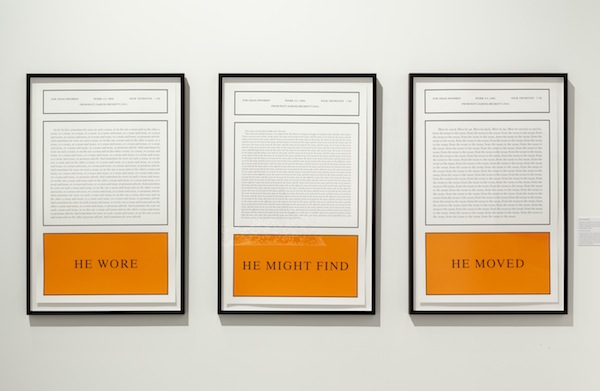
Thursday 30 June 2016
Parasol Unit, 14 Wharf Road, London N1 7RW
Forms of Criticism
Forms of Criticism proposes to think about critical practice as a creative experiment with form in its own right and invites a re-examination of the relationship between research and forms adopted for presenting, communicating, and disseminating it. By considering diverse sites of critical and creative production the project focuses on experimenting with modalities of criticism and ways of addressing formal critical-creative hybridity.
The event brings together artist, curators, writers, critics and scholars addressing questions of hybrid creative-critical forms in theory and practice though talks, performances, screenings, readings and installations. Speakers include: John Beck (IMCC), Kate Briggs (American University in Paris), Eric Cazdyn (University of Toronto), Ducks!, Gary Hall (Coventry University & Open Humanities Press), Peter Jaeger (poet and critic, Roehampton), Kristen Kreider (poet and artist, Royal Holloway), Richard Misek (filmmaker), Simon Morris (Leeds Beckett University), Jo Collinson Scott (musician and musicologist), Marquard Smith (Journal of Visual Culture and Piet Zwart Institute, Rotterdam), and Nick Thurston (artist, University of Pennsylvania and Leeds).
The event is free and open to all but places are limited and booking is essential. For more information about the event and to reserve tickets please go to: http://www.formsofcriticism.net/
For more information, please contact Kaja Marczewska: k.marczewska@westminster.ac.uk
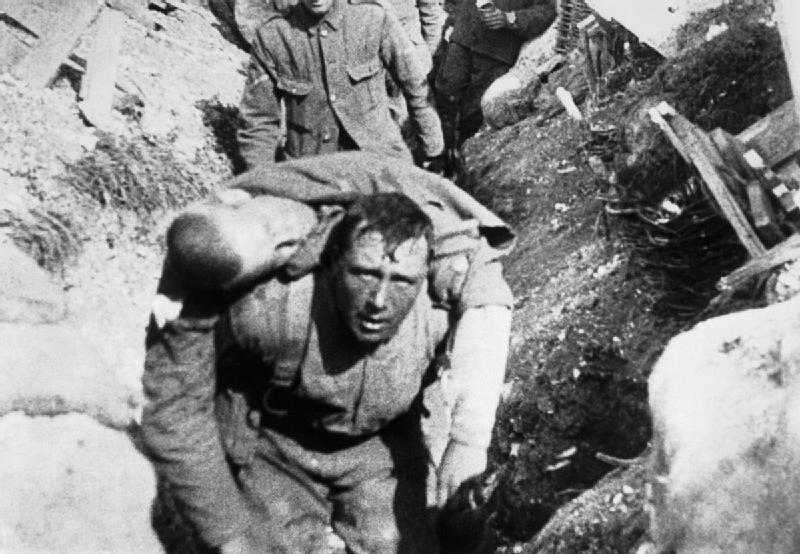
Tuesday 5th July 2016, 3-6 pm
University of Westminster, 4 – 12 Little Titchfield Street, London, W1W 7BY
Our friends in the Westminster Law School has collaborated with Imperial War Museums (IWM) to show the UNESCO listed film The Battle of the Somme, to audiences across the world. Shot and screened in 1916, it was the first feature length documentary about war and changed the way both cinema and film was perceived by the public. In the year of its release around 20 million people, almost half the population of Britain at the time, watched The Battle of the Somme many hoping to see the image of a loved-one, or friend captured on film. One hundred years later, this unique film from IWM’s collection, is being shown to commemorate the anniversary of the Battle of the Somme.
The event will be held at the University of Westminster building at Little Titchfield Street, London. The screening of the film will be followed by food and drink refreshments in Portland Hall where there will be additional archive material, displays and information to mark the centenary of this historic event.
Book a place here.

Saturday 25th 2016, 3.30 – 6.00 pm, followed by reception
Sunday 26th June 2016, 11.30 am – 5.30 pm
Room UG04, 309 Regent Street, London W1B 2HW
The Hypothetical: Institutions, Fictions, Environments
A hypothesis is literally a placing under, and thus a foundation or basis for an argument. As a foundation, though, a hypothesis is less than concrete; it is a starting point, a premise, a conjecture, a supposition. A hypothesis stands in a provisional relation to the known facts — may, indeed, fly in the face of the facts — and at worst can be described as a mere assumption or guess. A hypothesis, then, is a provocation. It demands investigation, testing, evaluation, perhaps refutation. A hypothesis has expectations.
The purpose of this conference is to interrogate the ramifications of the hypothetical in its philosophical, scientific, technological, historical, literary and artistic forms. How do the fictional, the conjectural, or the notional provide the operational conditions for new knowledge, new social and political forms, and new modes of describing the world? What are the temporalities that govern the hypothetical? How does the hypothetical put pressure on existing forms and practices, within and across the arts and the sciences? Are there limits — organisational, structural, ideological, disciplinary — beyond which the hypothetical collapses into the simply impossible? Or is the impossible an ideological bracketing of the emancipatory potential of the hypothetical? Alternatively, does the hypothetical run the risk of producing hypocriticism, a mode of reflexive and opportunist self-interest that merely reinscribes the position of the hypothesist?
Speakers: Claudia Aradau (King’s College London); Mark Currie (Queen Mary, University of London); Elizabeth Ellsworth & Jamie Kruse (by video link) (The New School, New York City); Mikhail Epstein (Emory University); Greg Garrard (University of British Columbia); John Richard Sageng (University of Oslo); David Wittenberg (University of Iowa).
View the conference programme here
The conference is free but it is essential to register via Eventbrite

Amanda Millis who is currently studying on the IMCC’s Art and Visual Culture MA is giving a talk this evening, Friday 24th June, after a documentary screening at Hackney Picturehouse as part of the Open City Documentary Festival. Directly following the UK premiere of Desert Migration, Amanda with Doc Duhon will be discussing the film and long-term HIV/AIDS survival. The discussion will be framed through the feminist psychoanalytic theory of Matrixial Subjectivity created by the artist and psychoanalyst, Bracha L. Ettinger. They will address matters such as the lack of an HIV/AIDS memorial in London and the immediate need for the NHS to provide PrEP. Following the dialogue, there will be an audience Q&A as well as information on accessible activist actions to provide PrEP on the NHS now.
Further details here: http://opencitylondon.com/films/desert-migration
Anne Witchard is part of a panel discussing the 1962 film The London Nobody Knows at the Genesis Cinema organised by the Luxury Book Club.
The London Nobody Knows is an important film every Londoner should watch once. It’s a privilege to re-experience the city through the prism of Geoffrey Fletcher’s eccentric gaze. Fletcher loves the romance of ruins, relishing are the places where a fragile connection with the past remains intact. He’s an explorer and an adventurer, a Londonologist. The film sees James Mason (smart casual and dressed for adversity in a flat cap) taking a stroll through shabby 1960s London. Edwardian tearooms, unusual gas lamps and crumbling terraces, rococo funeral parlours and art nouveau pubs, the ‘sleazy snack bars’ and the cast-iron balconies, forlorn music halls, old Jewish tailors and outmoded East End boutiques; redundant curiosities on the brink of oblivion.
Further details here.
Wednesday 29 June 2016, 7pm, Carroll/Fletcher, 56-57 Eastcastle Street, London, W1W 8EQ
Tickets £5, available here
Nick Thurston, an artist and critic, will discuss the work of Information as Material, an independent publishing project, which he co-edits with Simon Morris and Craig Dworkin. Thurston will address questions of materiality of language and independent and experimental publishing, and explore ideas about appropriated and subverted technologies of communication.
The talk will be followed by a conversation between Nick and critic and academic, Stephen Voyce.
This is the fifth event in the Experimental Writing @ Carroll/Fletcher series. Organised by the Institute of Modern and Contemporary Culture at University of Westminster and Carroll/Fletcher, the series showcases contemporary developments in experimental writing and their relationship to the visual arts.
Nick Thurston has exhibited and performed internationally at Denver Museum of Contemporary Art, Toulouse Museum of Contemporary Art, The Laurence Sterne Museum, Whitechapel Gallery, and Bury City Art Gallery, amongst others. He is the author of numerous publications ranging from poetry to prose essays. Since 2006, he has been a co-editor of Information as Material (iam). iam operates as a collective of writer-editors and as an independent imprint that publishes work by artists who use extant material — selecting it and reframing it to generate new meanings — and who, in doing so, disrupt the existing order of things. The imprint’s activities involve writing, publishing, exhibiting, curating, web-based projects, lectures and workshops. iam’s publications and editions are held in private and public collections around the world including Tate (UK), National Library of France (FR), and MoMA (USA). Nick’s own work is collected by the Electronic Poetry Center (University of Buffalo and University of Pennsylvania), which archived his work in 2015. The collection includes his poems, short writings, interviews and book extracts (2006-2014). Nick is a Programme Director of interdisciplinary undergraduate Fine Arts programme at the University of Leeds and a Visiting Fellow in Contemporary Writing at the University of Pennsylvania.
Stephen Voyce is Professor at the English Department at the University of Iowa, where he also holds appointments in the Digital Studio for the Public Arts & Humanities and the Center for the Book. He is the author of Poetic Community: Avant-Garde Activism and Cold War Culture (University of Toronto Press, 2013), the editor of a book of variations: love – zygal – art facts (Coach House Books, 2013), and the Director of the Fluxus Digital Collection. His work also appears in journals such as Jacket2 Magazine, Modernism/modernity, Criticism: A Quarterly Journal for Literature and the Arts, Postmodern Culture, and Open Letter. Voyce’s primary teaching and research interests include twentieth-century poetry, media studies, Marxist criticism and theory, and critical digital studies. Before joining the University of Iowa, he worked in the music industry and as a SSHRC-postdoctoral fellow at the Modern Literature and Culture Research Center in Toronto, Canada.
For more information, please contact either Kaja Marczewska: k.marczewska@westminster.ac.uk
or Asya Bachelis: asya@carrollfletcher.com
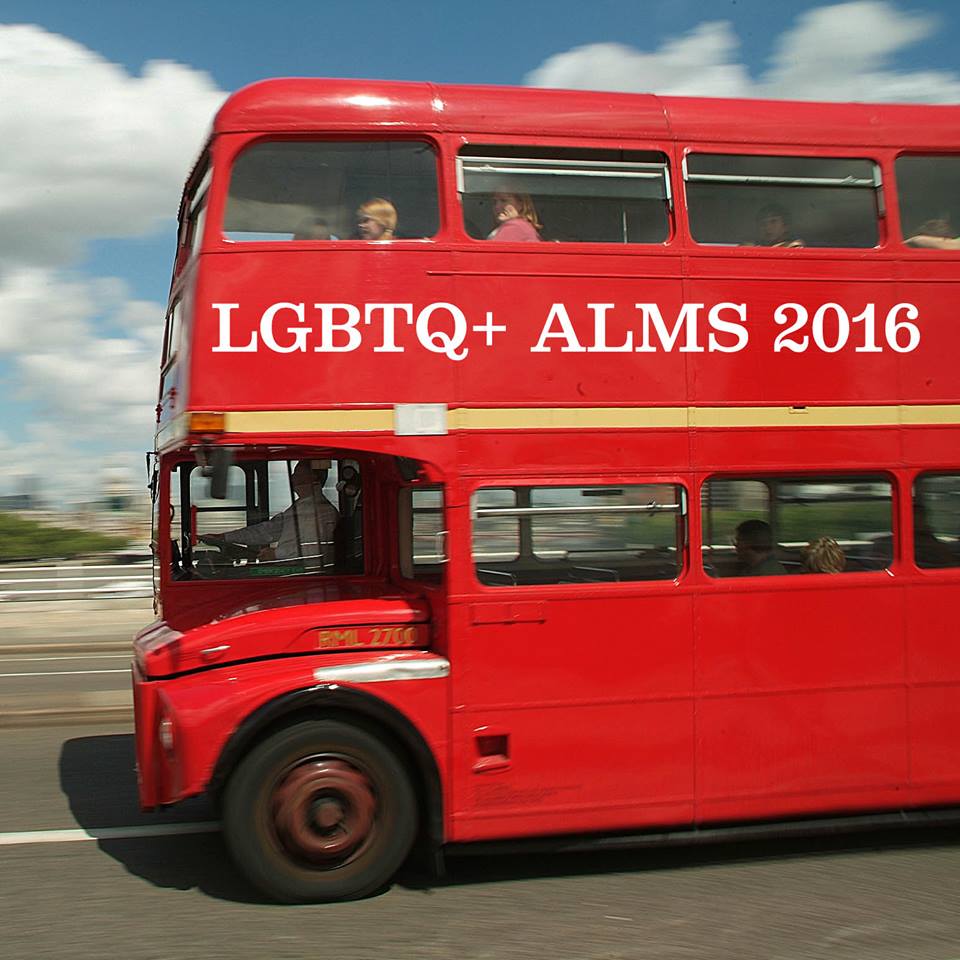
Wednesday 22nd – Friday 24th 2016
Bishopsgate Institute, University of Westminster, London Metropolitan Archives
“Without Borders”: LGBTQ+ Archives, Libraries, Museums and Special Collections
The Queer London Research Forum at the University of Westminster is co-hosting the three-day 2016 LGBTQ+ Archives, Libraries, Museums and Special Collections conference in collaboration with the Bishopsgate Institute and the City of London through the London Metropolitan Archives.
ALMS is an international conference focussed on the work by public, private, academic, and grassroots organisations which are collecting, capture and preserving archives of LGBTQ+ experiences. The conference began in Minnesota in 2006 when the Tretter Collection and Quatrefoil Library co-hosted the first LGBT ALMS Conference. The last conference took place in Amsterdam in 2012 and saw archivists, activists, librarians, museums professionals and academics from around the world coming together to share success stories and discuss challenges involved in recording LGBTQ+ lives. The 2016 conference is titled ‘Without Borders’, and the aim is to generate a dialogue within the co-dependent fields of LGBTQ+ historical research and collecting, and share experiences, ideas and best practice through a programme of presentations and short talks that explore margins, borders, barriers and intersections, past and present.
An evening reception to welcome delegates to London and the conference will be held in the Boardroom of the University of Westminster’s building at 309 Regent Street from 6-9pm on Tuesday 21st June. To help with drinks catering, please register via this Eventbrite page: https://goo.gl/N8kkXe
The three days of the conference will then take place at the Bishopsgate Institute (June 22nd), University of Westminster, 309 Regent St (June 23rd), and the London Metropolitan Archives (June 24th).
Full details and conference programme at: http://lgbtqalms.co.uk/
Full three day ticket (includes Tuesday evening reception)
£220 Institution
£100 Self-funded / unaffiliated
£40 students / unwaged / concessions (proof required)
You can book online here.
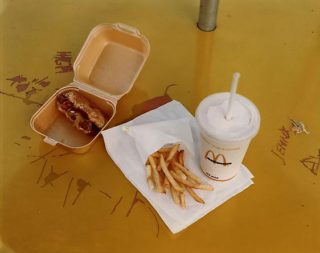
The second, third and fourth installments of David Cunningham’s series of pieces on the theme of Photography and the Language of Things are now up on the Still Searching blog hosted by our friends at the Winterthur Fotomuseum in Switzerland: Part Two, Part Three, Part Four.
Here’s the intro to the second:
In my previous post I tried to sketch out some of those questions provoked by a contemporary desire, in the words of Hito Steyerl, to side with and affirm the object. While this affirmation has coincided with a more general turn towards the object or thing in recent theoretical writing – and, consequently, away (or so it is said) from earlier concerns with language, text, discourse and sign – it has also been attached, in Steyerl and others, to a more specific call to rethink the character of ‘the image’, and of ‘our’ relationship to it, as one framed not by an “identification” with the image “as representation”, but precisely “with the image as thing”.
I want to focus in future posts upon some of the wider philosophical and political issues that are, I think, at stake in this, for photographic theory at least – including those quasi-animistic claims often made today for the capacity of the thing or object to speak of its own accord (sometimes combined with rather over-excited accounts of machine vision and photography’s automation), as well as, in my final post, the kinds of political oppositions, between, for example, a politics of representation and one of participation, that are frequently said to follow from this. In this current post, however, it seems useful, before doing so, to trace something like a ‘pre-history’ of the contemporary valorisation of the image as thing (as opposed to the image as representation) in order to try to draw out more clearly in my subsequent posts what might be distinctive about the particular ways in which this is conceived of today. [Continue …]
Parts Five and Six will be appearing before the end of June.

Monday 20th June, 10.30 am – 4.00 pm
The Boardroom, University of Westminster, 309 Regent Street, London W1
McLuhan’s Media Practice: Literature and Communication
Marshall McLuhan is a central and provocative figure in early media discourse – some of his pronouncements shaped the subject while others were divisive or obscure. However, his wide-ranging literary research, teaching and ground-breaking contributions to publishing still require detailed attention – for example, recent accessibility to his own richly annotated library presents a remarkable new research resource, while his collaborations with book designers remain hugely influential if inadequately understood. This symposium addresses McLuhan’s media practice from the dual perspectives of communication and literature, and introduces a new digital resource of archival McLuhan materials gathered from seven independent institutions and scholars during the last twelve months.
10.30-11.00 Coffee and Introductions
11.00-12.30 McLuhan’s Modernisms
McLuhan and Literary Modernism: David Cunningham, IMCC, University of Westminster
Annotation in Marshall McLuhan’s Library: John Shoesmith, Thomas Fisher Rare Book Library, Toronto
McLuhan and Modernist Spaces: Jon Goodbun, Architecture, University of Westminster
Fiore, McLuhan & Book Design: Doris Gassert, Fotomuseum Winterthur, Universität Basel
Contemporary Criticism and Small Presses: Leigh Wilson, IMCC, University of Westminster
12.30-2.00 Lunch and Discussion
2.00-3.15 Reading McLuhan Reading
Reading in the Future: Tom Lamberty, Merve Verlag, Berlin
The McLuhan Digital Resource: Simon Worthington, Mute Magazine, Berlin
McLuhan’s Media Practice: Graham Larkin, Curator, Ottawa
3.15-4.00 Closing Discussion
Register for a place here.
Friday 17th June 2016
St Pancras Room, King’s Place, 09:30-17:00
Sexual Violence Against Women: Voice and Representation
This one-day symposium organised by the IMCC’s Dr Georgina Colby with Hannah Camplin aims to bring keynote academics and practitioners in the fields of law, politics, and charities into dialogue with writers, artists, and filmmakers who take up the issues surrounding sexual violence against women in their works.
The symposium will open with a keynote address by Professor Jacqueline Rose (FBA, Birkbeck Institute for the Humanities, University of London), entitled ‘Feminism and the Abomination of Violence.’ Professor Rose’s keynote address will be followed by a lunchtime keynote paper by Keir Starmer MP, Holborn and St Pancras. There will be two afternoon panels on ‘Sexual Violence, Belief, and Credibility’, and ‘Voice and Representation: Empowering Voice and Enacting Change Through the Arts and Humanities’.
Tickets are priced at £6.00, excluding booking fee (£1.52). All proceeds from tickets sales will go to the Women’s Project at Asylum Aid. Tickets include coffee and refreshments throughout the day.
Tickets are available through Eventbrite.
Contact Georgina Colby for further information: g.colby@westminster.ac.uk.
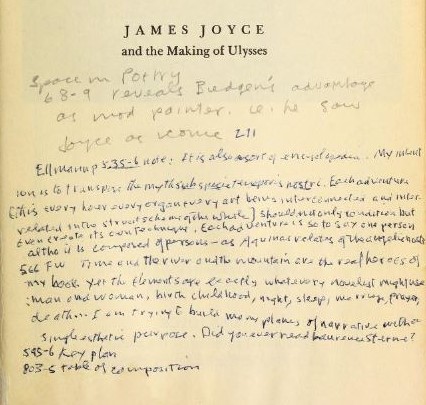
Monday 20th June, 10.30 am – 4.00 pm
The Boardroom, University of Westminster, 309 Regent Street, London W1
McLuhan’s Media Practice: Literature and Communication
Marshall McLuhan is a central and provocative figure in early media discourse – some of his pronouncements shaped the subject while others were divisive or obscure. However, his wide-ranging literary research, teaching and ground-breaking contributions to publishing still require detailed attention – for example, recent accessibility to his own richly annotated library presents a remarkable new research resource, while his collaborations with book designers remain hugely influential if inadequately understood. This symposium addresses McLuhan’s media practice from the dual perspectives of communication and literature, and introduces a new digital resource of archival McLuhan materials gathered from seven independent institutions and scholars during the last twelve months.
Discussing McLuhan’s contributions to our understandings of media practices, the history and futures of the book, and literary modernism, not least through his own annotations on texts by Joyce and others, the symposium welcomes participants from the Marshall McLuhan Estate, Canadian Embassy, Berlin and the Thomas Fisher Rare Book Library, as well as academics, curators and publishers with a special interest in McLuhan.
Speakers include: Andrea Boegner (McLuhan Salon, Canadian Embassy, Berlin), Peter Cornwell (Data Futures, IMCC), David Cunningham (IMCC), Duncan Forbes (Fotomuseum Winterthur, Switzerland), Doris Gassert (Fotomuseum Winterthur, Switzerland), Jon Goodbun (Architecture, Westminter), Tom Lamberty (Merve Publishing, Berlin), Graham Larkin (art historian, Ottawa), Andrew McLuhan (McLuhan Estate), John Shoesmith (Director, Thomas Fisher Rare Book Library, Toronto), Leigh Wilson (IMCC), and Simon Worthington (Mute, Berlin)
Register for a place here.

Veronica Posada Alvarez, one of the students on our MA Art and Visual Culture, is taking part in an event on The Case for London’s Latin Quarter. Organised by Latin Elephant, and setting out a strategy for the future of Elephant and Castle’s Latin American community, the event includes a discussion, photo exhibition and screening of a short documentary.
It takes place at 6.00pm on Monday 6 June at Draper Hall, 1 Howell Walk, London SE1 6LT. Further details here.


The Institute for Modern and Contemporary Culture
University of Westminster Department of English, Linguistics and Cultural Studies
32-38 Wells Street, London W1T 3UW. United Kingdom.

